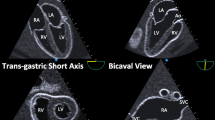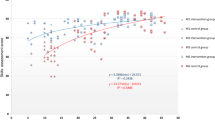Abstract
Transesophageal echocardiography (TEE) education is part of pediatric cardiology fellow training. Simulation-based mastery learning (SBML) is an efficient and valuable education experience. The aim of this project was to equip trainees with the basic knowledge and skill required to perform a pediatric TEE. The secondary aim was to assess the utility of using SBML for pediatric TEE training. The target group is trainees from pediatric cardiology and cardiac anesthesia who participated in a TEE bootcamp. A baseline knowledge pretest was obtained. The knowledge session consisted of preparation via reading material, viewing recorded lectures and completing an iterative multiple-choice examination, which was repeated until a minimum passing score of 90% was achieved. The skills session involved a review of TEE probe manipulation and image acquisition, followed by rapid cycle deliberate practice using simulation to acquire TEE skills at 3 levels, advancing in complexity from level 1 to level 3. Eight individuals (7 pediatric cardiology fellows at varying training levels and one anesthesia attending) participated in the TEE bootcamp. All reached a minimum knowledge post test score of at least 90% before the skills session. All subjects reached mastery in TEE probe manipulation. All reached mastery in image acquisition for the skill level that they attempted (level 1—8/8, level 2—8/8, level 3—4/4, with 4 participants not attempting level 3). A TEE bootcamp using SBML is a powerful medical education strategy. SBML is a rigorous approach that can be used to achieve high and uniform TEE learning outcomes among trainees of different training levels and backgrounds.




Similar content being viewed by others
References
ABP (2021) American Board of Pediatrics: Entrustable professional activities for subspecialties. https://www.abp.org/subspecialty-epas
Srivastava S et al (2015) Task force 2: pediatric cardiology fellowship training in noninvasive cardiac imaging: endorsed by the American Society of Echocardiography and the Society of Pediatric Echocardiography. J Am Soc Echocardiogr 28(9):1009–1019
Issenberg SB et al (2005) Features and uses of high-fidelity medical simulations that lead to effective learning: a BEME systematic review. Med Teach 27(1):10–28
Griswold S et al (2012) The emerging role of simulation education to achieve patient safety: translating deliberate practice and debriefing to save lives. Pediatr Clin N Am 59(6):1329–1340
Taras J, Everett T (2017) Rapid cycle deliberate practice in medical education - a systematic review. Cureus 9(4):e1180
McGaghie WC (2015) Mastery learning: it is time for medical education to join the 21st century. Acad Med 90(11):1438–1441
Barsuk JH et al (2016) Developing a simulation-based mastery learning curriculum: lessons from 11 years of advanced cardiac life support. Simul Healthc 11(1):52–59
McGaghie WC, Barsuk JH, Wayne DB (2017) The promise and challenge of mastery learning. Adv Med Educ Pract 8:393–394
McGaghie W, Barsuk JH, Wayne DB (eds) (2020) Comprehensive healthcare simulation: mastery learning in health professions education. Springer, New York
Eppich WJ et al (2015) Structuring feedback and debriefing to achieve mastery learning goals. Acad Med 90(11):1501–1508
Yudkowsky R et al (2015) Setting mastery learning standards. Acad Med 90(11):1495–1500
McGaghie WC et al (2011) Does simulation-based medical education with deliberate practice yield better results than traditional clinical education? A meta-analytic comparative review of the evidence. Acad Med 86(6):706–711
McGaghie WC et al (2015) Dissemination of an innovative mastery learning curriculum grounded in implementation science principles: a case study. Acad Med 90(11):1487–1494
Ceresnak SR et al (2016) Pediatric cardiology boot camp: description and evaluation of a novel intensive training program for pediatric cardiology trainees. Pediatr Cardiol 37(5):834–844
Ceresnak SR et al (2017) Advances in pediatric cardiology boot camp: boot camp training promotes fellowship readiness and enables retention of knowledge. Pediatr Cardiol 38(3):631–640
Allan CK et al (2016) A pediatric cardiology fellowship boot camp improves trainee confidence. Cardiol Young 26(8):1514–1521
Maskatia SA et al (2013) The echocardiography “boot camp”: a novel approach in pediatric cardiovascular imaging education. J Am Soc Echocardiogr 26(10):1187–1192
Kailin JA et al (2021) Online learning and echocardiography boot camp: innovative learning platforms promoting blended learning and competency in pediatric echocardiography. Pediatr Cardiol 42(2):389–396
Jujo S et al (2021) Transesophageal echocardiography simulator training: a systematic review and meta-analysis of randomized controlled trials. Simul Healthc 16(5):341–352
Raymond MR, Grande JP (2019) A practical guide to test blueprinting. Med Teach 41(8):854–861
NBME (2021) National board of medical examiners item writing guide
Miller GE (1990) The assessment of clinical skills/competence/performance. Acad Med 65(9 Suppl):S63–S67
Hunt EA et al (2014) Pediatric resident resuscitation skills improve after “rapid cycle deliberate practice” training. Resuscitation 85(7):945–951
Maxwell JC (2000) Failing forward : turning mistakes into stepping-stones for success. Thomas Nelson Publishers, Nashville
Graham TP, Beekman RH (2005) ACCF/AHA/AAP recommendations for training in pediatric cardiology. Training guidelines for pediatric cardiology fellowship programs. J Am Coll Cardiol 46(7):1380–1381
Nasca TJ et al (2012) The next GME accreditation system–rationale and benefits. N Engl J Med 366(11):1051–1056
Iobst WF et al (2010) Competency-based medical education in postgraduate medical education. Med Teach 32(8):651–656
Ross RD et al (2015) 2015 SPCTPD/ACC/AAP/AHA Training Guidelines for Pediatric Cardiology Fellowship Programs (Revision of the 2005 Training Guidelines for Pediatric Cardiology Fellowship Programs): Introduction. J Am Coll Cardiol 66(6):672–676
Larrabee JG et al (2020) Entrustable professional activities: correlation of entrustment assessments of pediatric residents with concurrent subcompetency milestones ratings. J Grad Med Educ 12(1):66–73
Ten Cate O (2017) Competency-based postgraduate medical education: past, present and future. GMS J Med Educ 34(5):69
Funding
The authors hereby state that they have no financial or non-financial conflict of interests that are directly or indirectly related to this work.
Author information
Authors and Affiliations
Contributions
Peter Koenig wrote the main manuscript text and prepared figure 1. Elaine Cohen prepared figures 2-4. Peter Koenig, Amanda Hauck, Nasia Husain, and Shivani Patel conducted the study, and participated in manuscript writing and review. William McGaghie functioned as senior author - editing and advising. All authors reviewed and approved the manuscript.
Corresponding author
Ethics declarations
Conflict of interest
The authors have no conflicts of interest to disclose.
Ethical approval
This study was classified exempt by the Lurie Children’s Hospital IRB.
Additional information
Publisher's Note
Springer Nature remains neutral with regard to jurisdictional claims in published maps and institutional affiliations.
Supplementary Information
Below is the link to the electronic supplementary material.
Rights and permissions
About this article
Cite this article
Koenig, P., Patel, S., Cohen, E.R. et al. Simulation Based Mastery Learning of Transesophageal Echocardiography. Pediatr Cardiol 44, 572–578 (2023). https://doi.org/10.1007/s00246-022-02950-9
Received:
Accepted:
Published:
Issue Date:
DOI: https://doi.org/10.1007/s00246-022-02950-9




